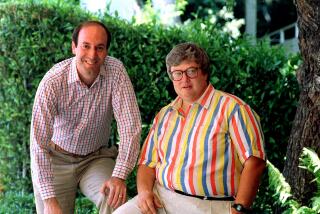After the Death of Gene Siskel, a Requiem for Film Criticism
For me, film criticism has been on life support for many years. Sadly, with the tragic death of Gene Siskel, it now has flatlined.
Just a few days ago, a nationally known news anchor told me that the problem with film criticism today is that “most critics are writing to and for each other, not for the public.” I heartily agree.
Siskel and Roger Ebert were the only film critics who were truly answerable to the public. TV shows depend on ratings. If Siskel and Ebert were not connecting with their audience, their show
would have fallen in the ratings and been canceled. As a team with that elusive chemistry that occurs only by magic, Gene and Roger
did, however, consistently review for their audience.
Other than Siskel and Ebert, however, how many of us actually relate to the film criticism we are offered? Does it seem to you, the reader of this newspaper, that most critics are actually writing for you . . . for us . . . or are they writing for a select group of their peers?
In the past, film critics tried to review films for the audiences who were most likely to be attracted to the subject matter. Does it not make sense that one needs to review a film like “Armageddon” with a different audience in mind than a film like “Gods and Monsters”? If you, as a filmgoer, are interested in “Armageddon,” don’t you want to read an objective review by a critic who has your curiosity and interest in mind? When national critics universally eviscerate a film like “Armageddon” and it goes on to gross $200 million domestically, it should perhaps occur to those who are responsible for hiring and retaining film critics that perhaps most are out of touch with their audience.
Gene Siskel was in touch . . . and now he’s gone.
Gene was an acquaintance of mine for almost 30 years. We met when we both had just graduated college. We stayed in touch throughout the years, and we had a running joke between us because he almost never gave good reviews to any film that I produced or supervised. I think my lifetime record with him was something like five “wins” and 17 “losses.” When I would question him, he would just gently chide me to “make better movies.” That was pure Gene--a total gentleman.
Oddly, and eerily, the best review he ever gave a film of mine was one of the last he reviewed (“What Dreams May Come”). I had known that he had been ill, but I was still shocked when I saw him reviewing our film in October. He looked and sounded very frail, and I was very much struck that there he was, reviewing a film about the afterlife.
The conceit of our film was that we create our own reality, both in this life and after life. I have been wondering if it inspired Gene to project himself into his future and, if he did, what he saw. I can only hope that his afterlife would be filled with endless classics by Capra, Scorsese, Coppola, Sturges and others . . . or, conversely, maybe no movies at all!
A wonderful friend of the movies and movie people is now gone. Gene loved movies and cared deeply about their effect on audiences. He challenged us to be the very best we could be, applauding when we succeeded and chastising us when we failed. His only ire was reserved for those whom he saw as sullying the medium itself.
Both our industry and filmgoers have lost a real champion and, for that, we all should truly mourn.
*
Counterpunch is a weekly feature designed to let readers respond to reviews or stories about entertainment and the arts. Please send proposals to: Counterpunch, Calendar, Los Angeles Times, Times Mirror Square, Los Angeles CA 90053. Or fax: (213) 237-7630. Or e-mail: C[email protected]. Important: Include full name and phone number. Please do not exceed 600 words. We appreciate all proposals and regret that we cannot respond to each.
More to Read
Only good movies
Get the Indie Focus newsletter, Mark Olsen's weekly guide to the world of cinema.
You may occasionally receive promotional content from the Los Angeles Times.










